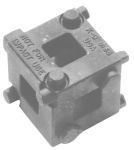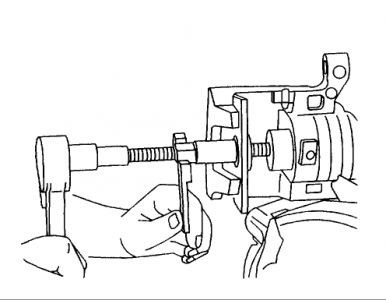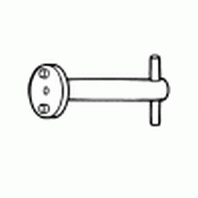Nope. When you're hearing and feeling the pulsing, that's due to the system activating, and that part is normal. The first thing is to have the diagnostic fault codes read and recorded. When the yellow ABS warning light is on, the computer has detected a problem, turned the system off, and set a diagnostic fault code to indicate the circuit or system that needs further diagnosis.
A real common cause of false activation on GM trucks is rust buildup under the front wheel speed sensors. Your front and rear wheel bearings come with the same sensors used on front-wheel-drive cars, and they've been causing a real lot of problems. Those sensors develop rather wimpy signals to start with, then just a little play develops in the bearings, which is common on all car brands, but that is enough for the speed signals being generated to be reduced even more until the computer can't read them. This is not an electrical problem, as in a broken wire. That is all okay, and the computer proves that by its self-tests when you turn on the ignition switch. This is a mechanical problem that is going to keep occurring. A lot of people report new wheel bearings develop the same problem in as little as 15,000 miles.
It's important to note that this problem will be detected while you're driving with your foot off the brakes. When you feel the brake pedal pulsing, the system is responding to the missing wheel speed signal and is interpreting that as that wheel is about to lock up and skid. The warning light won't be on if the system is activating. While driving, the computer expects to see four equal wheel speeds. When the signal is missing from one, or it is so weak it reads that as the wheel is going slower than the others continuously while you're driving, it knows that tire isn't skidding constantly. It figures out something is wrong with that sensor by comparing it to the other signals, then sets the fault code for a missing signal for that wheel.
A real common problem that owners cause for themselves is when they wait many months to have this fixed. Whatever is happening to the left front wheel bearing is also happening to the right one, so it too is likely to develop the same problem at roughly the same mileage. The problem is that since the computer constantly compares all four wheel speeds to each other, when the first fault code sets, the computer knows it can't use that as a reference, so it suspends all the other self-tests that rely on that signal. While you're procrastinating getting it fixed, the other front bearing might develop the same issue, but since the self-tests have been suspended, a second fault code related to the second wheel might not set. All the mechanic has to go on when calculating an estimate for repair is the one fault code. After he replaces that first wheel bearing / sensor assembly, and goes out for a test drive, the self-tests resume, and that's when the second problem is detected. The warning light turns right back on again, and he has to start the diagnosis all over again. Then he has to tell you more parts are needed. We really hate having to do that, and it's frustrating for car owners. You incorrectly assume he is incompetent or out to squeeze more money out of you. You have enough trouble already dealing with a manufacturer that puts profits way ahead of customer satisfaction, but this issue can be avoided by either having the first problem repaired right away, or if this is indeed a wheel bearing concern, have both front bearings replaced at the same time.
Also be aware that in the past the rear wheel speed sensors didn't cause much trouble, so now your vehicles uses the same front bearings on the rear. Logic would dictate they will also develop that little play that is the cause of all this, but I wouldn't be too quick to have them replaced unless that is what the fault code points to. The front bearings are under much more stress from cornering forces and from holding up the weight of the drive train. The rear bearings should last longer than the front ones.
Also be aware that reputable repair shops give you back your old parts or make them available to you. On the front-wheel-drive cars, we were replacing numerous front wheel bearings every week, and we found that these bearings WITH the speed sensors cost less than the exact same bearings without the sensors. All we bought was bearings with the sensors because on the cars without anti-lock brakes, you just didn't connect the sensors. Next, since so many of these bearings had such low miles when they caused ABS problems, we started saving the old ones to give to people who needed a new bearing but not the sensor. If you look in the dealers' scrap metal bins, you'll see dozens of these bearings, and most of them would work just fine on non-ABS cars.
Saturday, May 23rd, 2020 AT 1:46 PM
(Merged)






